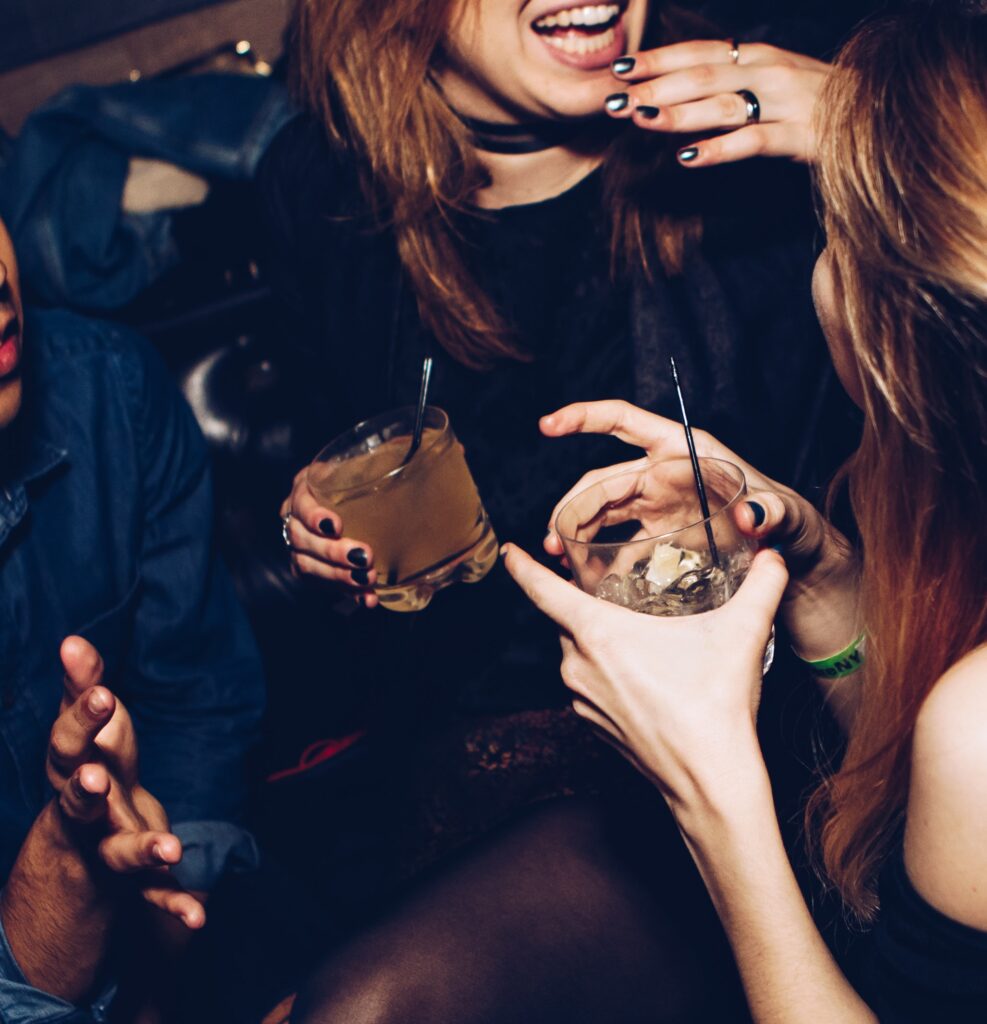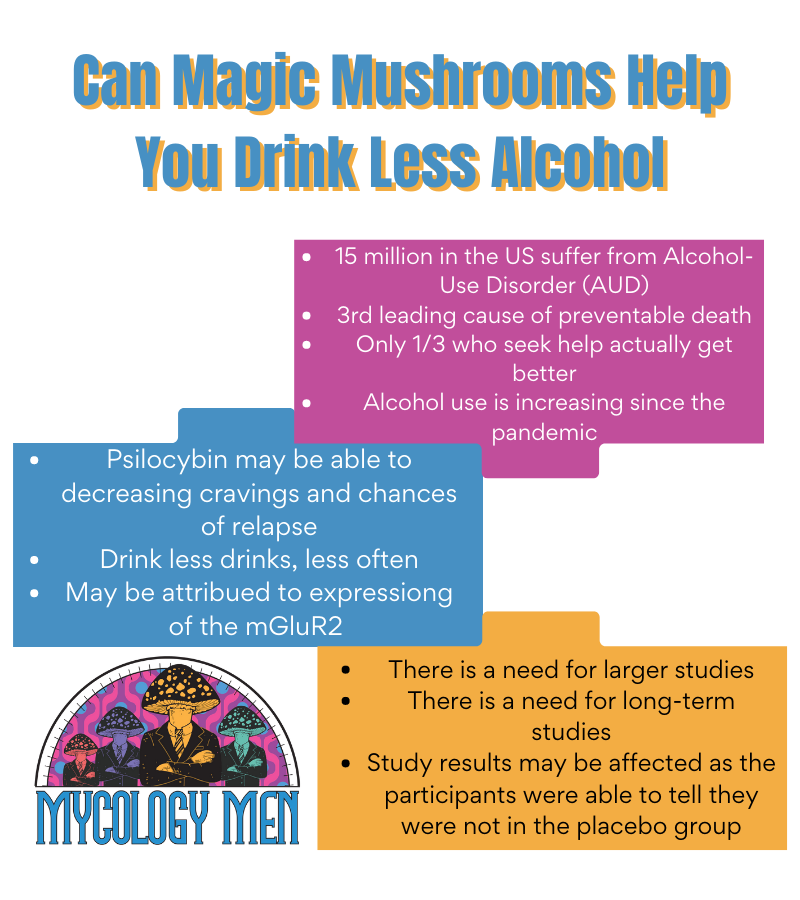Can Magic Mushrooms Help You Drink Less Alcohol?
If you are like many others in the world, spending time being social usually involves a few alcoholic drinks. Maybe more than a few. Some people find moderation pretty easy, but others may begin to drink more drinks more and more often. It might surprise you to learn that binge drinking is defined by the CDC as having more than 5 drinks for men or 4 drinks for women on any occasion.*
Having 5 or more drinks does not automatically mean you have an alcohol substance abuse problem (alcohol use disorder, AUD). Nearly 15 million people in the United States suffer from AUD and less than 10% of those people receive any form of treatment. About 100,000 people die from alcohol-related issues every year. This makes alcohol the 3rd highest cause of preventable death in the US.*
Of those that seek treatment for AUD, only about ⅓ actually get better. Another ⅓ stay the same and the last ½ actually get worse.* The FDA has only approved 3 medications for AUD and all of them have limitations that make them not ideal for many. There does not seem to be a clear-cut solution to AUD and what is worse is that the problem is growing. Since the 2020 pandemic began, alcohol sales have more than doubled.* So, what is someone who wants to drink less supposed to do?
The active ingredient in magic mushrooms, psilocybin, has shown some pretty promising results when it comes to cutting out alcohol (or at least cutting back). Let’s take a look at some of the research on magic mushrooms and alcohol addiction and see if using magic mushrooms really can help you decrease your alcohol intake, making you a healthier individual.

Now onto magic mushrooms and alcohol addiction... So, can magic mushrooms really help you cut back on or cut out alcohol? Research on this topic is unfortunately lacking, but we do hope to see some more studies coming out as magic mushrooms become more prominent in the mental health space. The research that is out there does seem promising. A recent study from August of this year (2022) had some pretty noticeable results.
The study looked at participants with AUD and how their alcohol intake changed after doses of psilocybin paired with psychotherapy. An overwhelming majority of those treated with psilocybin decreased the amount of drinks per day they consumed as well as the amount of days per week they drank.
These results came from a pairing of psilocybin with psychotherapy sessions. The psilocybin dose alone may not achieve the same results. Putting the psilocybin experience into actionable words had the biggest effect on participant’s alcohol use.
One participant described* the visual effects (hallucinations) he had from the dose of psilocybin and how this caused him to change his alcohol-consumption habits. He saw things like a glass bottle disintegrating in the desert, himself being cut with a sword, and him scaling a mountain. He interpreted these, respectively, to mean that he was putting down the bottle, killing his addiction, and overcoming an unhealthy relationship.
Although promising, we must be careful of drawing iron-clad conclusions from this study as there were some limitations. For one, this study was supposed to be a blind study where participants did not know if they received psilocybin or a placebo. It turns out that it is pretty easy to guess which group you are in once the effects of the hallucinogen (psilocybin) take hold. Aside from that, the study was relatively small with only 93 participants.
Larger studies on magic mushrooms and alcohol addiction are needed to draw more well-founded conclusions. Longer term studies are also needed as this study only followed participants for 8 months with no further follow-up. A final limitation comes as a consequence of addiction studies in general. When someone signs up for an addiction study, they tend to start using the substance less just because they become aware of it.
Another study dating back to 2015 found similarly promising results. Following a dose of psilocybin, participants “significantly” increased their abstinence from drinking relative to before the dose. This abstention was maintained amongst a large portion of the participants at the 36 week follow-up period. Again, while these results appear promising, there is a need for larger studies with longer durations.
As for how psilocybin actually helps you lay off the booze, a study from 2021 on magic mushrooms and alcohol addiction may be able to shed some light. There is a specific receptor in our bodies, mGluR2, that plays a role in our alcohol cravings, self-control, and decision-making. When expression of this receptor is reduced, cravings are increased and self-control is impaired. The study found that psilocybin was able to restore expression of the receptor, therefore decreasing alcohol cravings and reducing chances of a relapse.

Let’s break down magic mushrooms and alcohol addiction into a quick wrap-up. There are a few promising studies which outline psilocybin’s use to decrease alcohol cravings,alcohol- use, and relapse. Pairing psilocybin with psychotherapy was advantageous to participants in one study; allowing them to analyze their hallucinations and create actionable steps to take from there.
These benefits might arise from psilocybin’s interaction with the receptor called mGluR2. This receptor plays a part in your alcohol-cravings, self-control, and decision-making. Psilocybin was shown to decrease cravings, increase abstention from alcohol, and decrease chances of a relapse.
We must be careful drawing conclusions from these results as there is still a need for larger studies on magic mushrooms and alcohol addiction and ones that follow-up on long-term effects. That being said, the results do seem promising.
Always use magic mushrooms and psilocybin in a controlled therapy setting with a professional guide. Magic mushrooms are illegal to possess in the United States unless in a controlled therapy setting (in some states only).
Hope you liked our article on magic mushrooms and alcohol addiction! Want to read more topics about the benefits of mushrooms? Make sure to check out our blog!